Related Research Articles
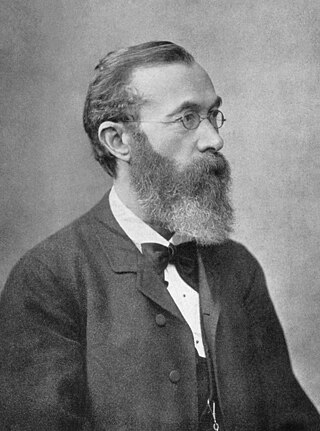
Wilhelm Maximilian Wundt was a German physiologist, philosopher, and professor, one of the fathers of modern psychology. Wundt, who distinguished psychology as a science from philosophy and biology, was the first person ever to call himself a psychologist.

Franz Clemens Honoratus Hermann Josef Brentano was a German philosopher and psychologist. His 1874 Psychology from an Empirical Standpoint, considered his magnum opus, is credited with having reintroduced the medieval scholastic concept of intentionality into contemporary philosophy.

Carl Stumpf was a German philosopher, psychologist and musicologist. He is noted for founding the Berlin School of experimental psychology.
Psychology is defined as "the scientific study of behavior and mental processes". Philosophical interest in the human mind and behavior dates back to the ancient civilizations of Egypt, Persia, Greece, China, and India.
Theodor Oswald Rudolph Külpe was a German structural psychologist of the late 19th and early 20th century. Külpe, who is lesser known than his German mentor, Wilhelm Wundt, revolutionized experimental psychology at his time. In his obituary, Aloys Fischer wrote that, “undoubtedly Külpe was the second founder of experimental psychology on German soil; for with every change of base he made it a requirement that an experimental laboratory should be provided.”
Philosophische Studien was the first journal of experimental psychology, founded by Wilhelm Wundt in 1881. The first volume was published in 1883; the last, the 18th, in 1903. Wundt then founded a similar volume entitled Psychologische Studien, with volumes from 1905 to 1917.
Jochen Fahrenberg is a German psychologist in the fields of Personality, psychophysiology and philosophy of science.

Erich Schröger is a German psychologist and neuroscientist.

Karl Ludwig Bühler was a German psychologist and linguist. In psychology he is known for his work in gestalt psychology, and he was one of the founders of the Würzburg School of psychology. In linguistics he is known for his organon model of communication and his treatment of deixis as a linguistic phenomenon.
Structuralism in psychology is a theory of consciousness developed by Edward Bradford Titchener. This theory was challenged in the 20th century.
Georges Dwelshauvers, who also wrote under the pseudonym Georges Mesnil (1866–1937) was a Flemish Belgian philosopher and psychologist. He was the brother of the art critic and anarchist Jacques Mesnil.
Archiv für die gesamte Psychologie is a German language scientific journal on psychology, founded in 1903 by E. Meumann. It was the "logical successor" to Wilhelm Wundt's Philosophische Studien.
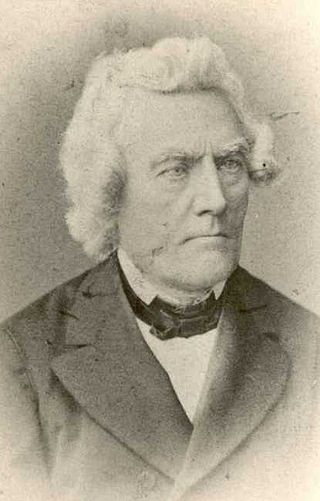
Moritz Wilhelm Drobisch was a German mathematician, logician, psychologist and philosopher. His brother was the composer Karl Ludwig Drobisch (1803–1854).
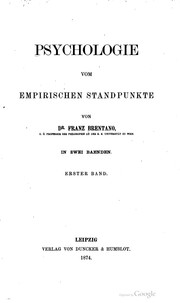
Psychology from an Empirical Standpoint is an 1874 book by the Austrian philosopher Franz Brentano, in which the author argues that the goal of psychology should be to establish exact laws. Brentano's best known book, it established his reputation as a philosopher, helped to establish psychology as a scientific discipline, and influenced Husserlian phenomenology, analytic philosophy, gestalt psychology, and the philosopher Alexius Meinong's theory of objects. It has been called Brentano's best known work and has been compared to the physician Wilhelm Wundt's Grundzüge der physiologischen Psychologie and the Project for a Scientific Psychology of Sigmund Freud, the founder of psychoanalysis.
Völkerpsychologie is a method of psychology that was founded in the nineteenth century by the famous psychologist, Wilhelm Wundt. However, the term was first coined by post-Hegelian social philosophers Heymann Steinthal and Moritz Lazarus.
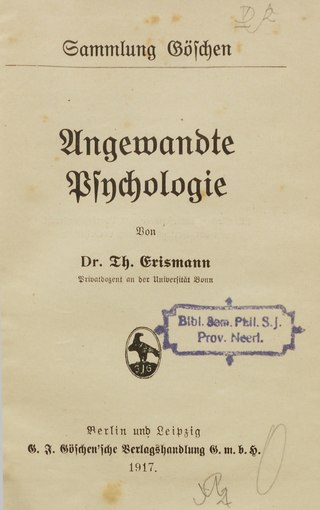
The book "Angewandte Psychologie", by the Swiss-Austrian psychologist and philosopher Theodor Paul Erismann, was published in 1917 in Berlin and Leipzig. It discusses major topics concerning school, work, law and their connections to psychology. The book aims at giving a short overview of how psychology can be applied to important areas in life. Erismann uses many applicable tests and describes them in great detail, thus providing a practical guideline on how to use the findings of psychology in different fields.
Die Seele: Ihr Verhältnis zum Bewusstsein und zum Leibe is a book by the German philosopher and psychologist Joseph Geyser was published in the journal "Wissen und Forschen " in 1914.
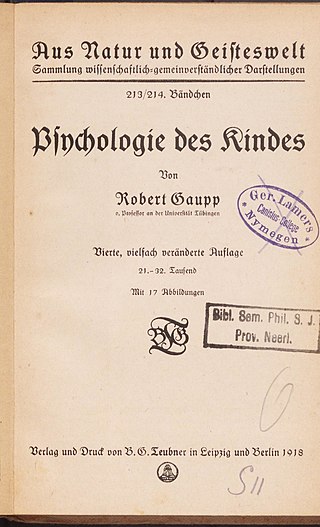
Psychologie des Kindes is a book written by the German psychiatrist and neurologist Robert Gaupp. It was first published in 1907 by the publishing house B.G. Teubner Leipzig Berlin. There were a total of four versions of the book, the last revised version appearing in print in 1917.
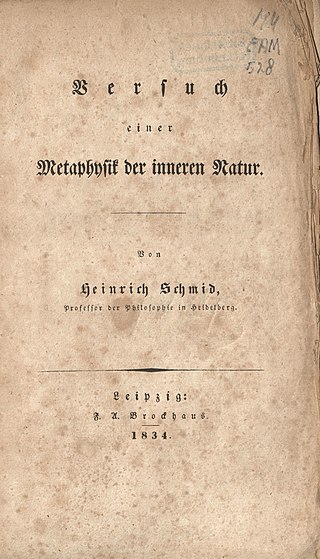
Versuch einer Metaphysik der inneren Natur is a book written by German author Heinrich Schmid (1799–1836). It was published by Brockhaus Leipzig in 1834. In this book, Schmid attempts to develop a metaphysical account of humans' inner nature, the soul, in terms of general laws. These laws, Schmid proposes, should be based on empirically gathered knowledge about inner nature. He argues, that with the formulation of such laws, psychology, the science of the human soul, should become a natural science like physics. Schmid's ideas build heavily on the philosophy of Immanuel Kant, for which he was criticized. He belonged to the philosophical school surrounding Jakob Friedrich Fries, whose ideas are associated with Neo-Kantianism. Schmid's theories, especially concerning memory, were adopted by Sir William Hamilton, whose philosophy was discussed by John Stuart Mill at the end of the 19th century. Wilhelm Wundt and his contemporaries still used methods similar to Schmid's structured introspection once psychology was founded as an independent discipline in 1879.

German: Lehrbuch der Psychopathologischen Untersuchungs-Methoden is a book written by German psychiatrist Robert Sommer (1864-1937), first published in 1899 by Urban & Schwarzenberg. In its 388 pages, Sommer presents a framework of ideas delving into the core of psychopathological symptoms, employing new analytical techniques and psychophysiological experiments.
References
- Wilhelm Wundt (1897), Outlines of Psychology ( Grundriss der Psychologie ).
- E. B. Titchener, "Brentano and Wundt: Empirical and Experimental Psychology", The American Journal of Psychology, 32(1) (Jan. 1921), pp. 108–120.